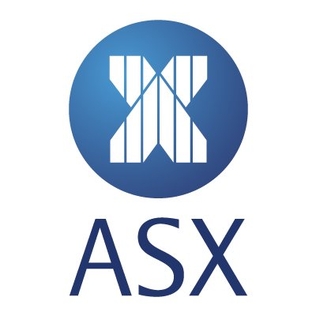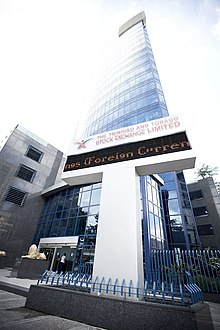
The economy of Trinidad and Tobago is the third wealthiest in the Caribbean and the fifth-richest by GDP (PPP) per capita in the Americas. Trinidad and Tobago is recognised as a high-income economy by the World Bank. Unlike most of the English-speaking Caribbean, the country's economy is primarily industrial, with an emphasis on petroleum and petrochemicals. The country's wealth is attributed to its large reserves and exploitation of oil and natural gas.

Australian Securities Exchange Ltd (ASX) is an Australian public company that operates Australia's primary securities exchange, the Australian Securities Exchange. The ASX was formed on 1 April 1987, through incorporation under legislation of the Australian Parliament as an amalgamation of the six state securities exchanges, and merged with the Sydney Futures Exchange in 2006.

Petroleum Company of Trinidad and Tobago Limited was a state-owned oil company in Trinidad and Tobago. Its principal activities were the exploration, development and production of hydrocarbons in addition to the manufacturing and marketing of petroleum products.

The Barbados Stock Exchange or BSE is Barbados' main stock exchange. Its headquarters are in the capital-city Bridgetown. The body was established in 1987 by the Parliament of Barbados as the Securities Exchange of Barbados (SEB), and remained known as such until August 2, 2001. The unique four symbol alphanumeric Market Identifier Code (MIC) used to identify the BSE as defined under ISO 10383. of the International Organization for Standardization (ISO) is: XBAB.
CL Financial was the largest privately held conglomerate in Trinidad and Tobago and one of the largest privately held corporations in the entire Caribbean, before the company encountered a major liquidity crisis and subsequent bailout in 2009.

CIBC Caribbean is a financial services company based in Barbados and the Caribbean subsidiary of the Canadian Imperial Bank of Commerce (CIBC). The bank was founded in 2002 as FirstCaribbean International Bank through the merger of the Caribbean operations of Barclays Bank and CIBC, and in March 2006 both CIBC and Barclays announced that Barclays wished to exercise their option to exit the Caribbean venture completely resulting in CIBC gaining majority-control of the bank. In June 2011, it was announced the bank would be renamed CIBC FirstCaribbean Bank "to be more closely aligned to the CIBC brand, while still maintaining the FirstCaribbean name and local identity." The name was then later changed CIBC Caribbean in January 2024. The majority of the bank's revenues are generated by its operations in Barbados, the Bahamas and the Cayman Islands.

The Casablanca Stock Exchange is a stock exchange in Casablanca, Morocco. The Casablanca Stock Exchange (CSE), which achieves one of the best performances in the region of the Middle East and North Africa (MENA), is Africa's third largest stock market after Johannesburg Stock Exchange and Nigerian Stock Exchange in Lagos. It was established in 1929 and currently has 19 members and 81 listed securities with a total market capitalisation of $71.1 billion in 2018.

The Stock Exchange of Mauritius (SEM) ; is an organization responsible for the operation of Mauritius's primary stock exchange located at Port Louis. The SEM operates two markets: the Official Market and the Development & Enterprise Market (DEM). There are 40 companies listed on the Official Market representing a Market Capitalization of nearly US$5.3 billion, the DEM presently has 48 companies listed with a market capitalisation of nearly US$1.5 billion as at 31 July 2012. SEM is one of the leading Exchanges in Africa and a member of the World Federation of Exchanges.
The S&P/ASX 200 (XJO) index is a market-capitalisation weighted and float-adjusted stock market index of stocks listed on the Australian Securities Exchange. The index is maintained by Standard & Poor's and is considered the benchmark for Australian equity performance. It is based on the 200 largest ASX listed stocks, which together account for about 82% of Australia's share market capitalisation.
The Royal Bank of Trinidad and Tobago (RBTT) was a commercial bank based in Trinidad and Tobago and one of the largest commercial banking corporations in the Caribbean region. As of 2008, RBTT Holdings had a group asset base of over US$6.2 billion dollars. The RBTT group of companies operated several commercial banking businesses in other neighbouring islands, as well as various investment holdings in various parts of the Trinidad and Tobago economy. On 26 March 2008, RBTT Shareholders voted 98.18 percent in favour of selling the bank to the Royal Bank of Canada (RBC), who previously had divested the bank in 1987. On 16 June 2008, RBC completed the acquisition. RBTT Financial Holdings Limited and RBC Holdings Limited, a subsidiary of RBC, will amalgamate and continue as a wholly owned indirect subsidiary of RBC. The head office of the Caribbean operations for RBC will be located at Port of Spain, the capital of Trinidad and Tobago, and the site of RBTT's headquarters.

The Bermuda Stock Exchange (BSX), established in 1971, is located in Hamilton, Bermuda. The stock exchange's 2010 'Year End Review' report stated that its aggregate market capitalisation stood at US$319 billion.

Republic Bank Limited is a Caribbean financial institution headquartered in Trinidad and Tobago. It has operations in Anguilla, Barbados, the British Virgin Islands, the Cayman Islands, Dominica, Ghana, Grenada, Guyana, St. Kitts and Nevis, Saint Lucia, St. Maarten, St. Vincent and the Grenadines, Suriname and Trinidad and Tobago. It was formerly a division of Barclays Bank in Trinidad and Tobago.

The Central Bank of Trinidad and Tobago is the central bank of Trinidad and Tobago.

The Muscat Securities Market is the only stock exchange in Oman. It was established by the Royal Decree (53/88) issued on 21 June 1988, to regulate and control the Omani securities market and to participate, effectively, with other organisations for setting up the infrastructure of the Sultanate's financial sector.

Guardian Holdings Limited is a conglomerate of insurance and financial services companies in the Caribbean. Its headquarters are in Westmoorings, Trinidad and Tobago and its history goes back to 1847. At one time it was known as Standard Life and the company has since been rebranded under the name Guardian Group.

The following outline is provided as an overview of and topical guide to Trinidad and Tobago:
The National Petroleum Marketing Company, better known by its brand name National Petroleum (NP), is a state-owned refined petroleum distribution and marketing company owned by the government of Trinidad and Tobago. From its inception in 1972 until 1999, NP was the sole government-authorized distributor of gasoline, diesel fuel, and other consumer refined petroleum products in the island nation. The company has since expanded into lubricants, liquified petroleum gas, aviation fuel, and bunker fuel.
The nation of Trinidad and Tobago has been the leading supporter of the Caribbean Community (CARICOM). Trinidad and Tobago was one of the four members in 1973 which then along with Barbados, Guyana and Antigua and Barbuda moved to establish the organisation that today it known as the Caribbean Community and Common Market. The new organisation because a successor to the Caribbean Free Trade Association (CARIFTA) by the Treaty of Chaguaramas, of which Trinidad and Tobago was a leading member and also a founding member.

The NCB Financial Group Limited(JSE: NCBFG) is a financial services conglomerate operating in the Caribbean region and headquartered in Kingston, Jamaica. NCB Financial Group Limited is the parent company of the National Commercial Bank of Jamaica, the largest and most profitable financial institution in Jamaica. It is also the majority shareholder of Guardian Holdings Limited, one of the largest insurance providers in the Caribbean, and of Clarien Group Limited, a banking and investment management services provider based in Bermuda. The company is listed on the Jamaica Stock Exchange and Trinidad & Tobago Stock Exchange.
Trinidad Petroleum Holdings is a state-owned oil company in Trinidad and Tobago. Its principal activities are the exploration, development, and production of hydrocarbons, operations it conducts through its primary subsidiary, Heritage Petroleum Company Ltd. Trinidad Petroleum Holdings also owns Guaracara Refining Company Ltd, which operates the nation's only petroleum refinery. It also owns the Paria Fuel Trading Company subsidiary, which imports refined petroleum products, and stores and distributes them domestically.














